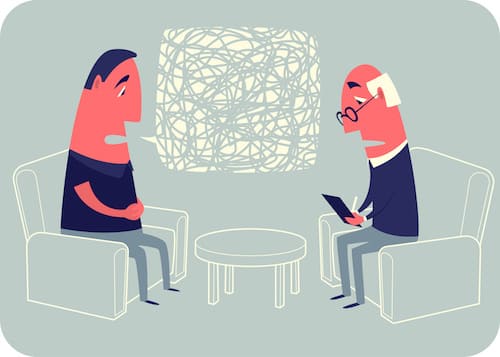September 17, 2018
By Ken Duckworth, M.D.
If you or someone you know is experiencing a mental health, suicide or substance use crisis or emotional distress, reach out 24/7 to the 988 Suicide and Crisis Lifeline (formerly known as the National Suicide Prevention Lifeline) by dialing or texting 988 or using chat services at 988lifeline.org to connect to a trained crisis counselor. You can also get crisis text support via the Crisis Text Line by texting NAMI to 741741.

As I was entering medical school, I found out that my mother had made a postpartum suicide attempt. I did not find out from her; it was shared with me in hushed tones by another family member who thought I should know, “now that I was going to be a doctor.” I was quite surprised by this information. And it made me sad to think that this wasn’t a topic she felt she could openly discuss.
Suicide is a challenging issue for all of us. Secrecy surrounds the topic, with shame as a common co-traveler. That’s why it’s an honor for me to be a small part of NAMI’s movement to make seeking help and support more acceptable. I’ve met many resilient people in the NAMI community who have overcome suicidal thoughts or actions. Often because there was a person who stood by them during a crisis or a new treatment approach that made a difference in their life. Some found sobriety for a co-occurring substance use disorder. Others found clozapine or lithium, which have been shown to reduce suicidal thinking. Some learned coping skills through a psychotherapy like cognitive behavioral therapy or dialectical behavioral therapy. Many found relief in the community of NAMI. Regardless of how, their suicidal thoughts or actions were talked about and changed.
My field sorely needs similar conversation and change. Doctors also have high rates of suicide and it’s a major issue that some of the doctors we turn to for care are often not taking care of themselves. We need to teach help-seeking behaviors in the medical and psychiatric fields. Doctors need the same support and encouragement to get help as their patients.
I lost a patient to suicide early in my psychiatric residency. This was a person with many strengths, who was also in tremendous psychological pain. I worried about him during off-hours and felt powerless to help at times. After I learned of his tragic outcome, I was upset, slept poorly and struggled at work for months. I was worried I had said the wrong thing or had failed in some way as an inexperienced psychiatrist. I seriously considered leaving the field and entering another specialty. I was lucky to receive support and empathy from my colleagues and supervisors as they encouraged me to seek therapy. I did my best to carry on, but I never forgot about this patient and his suffering.
Last year, at an American Psychiatric Association (APA) event, I was impressed that even doctors are wondering if they worry, struggle and stress too much. APA president Anita Everett reviewed the stresses that commonly consume doctors and announced that psychiatric wellness would be a core feature of her leadership. Dr. Everett’s thoughtfulness and openness on the stresses doctors face and her emphasis on help-seeking was powerful; her efforts have started many overdue conversations across the entire field of medicine. Unfortunately, the same shame that led to the secrecy around my mother’s postpartum suicide attempt is alive and well in the medical field.
Doctors don’t have all the answers for stress, mental illness and suicide—our most challenging aspects of being human. Medical culture needs to continually evolve and learn from the remarkable and resilient people like those I have met at NAMI. Facing your mental health challenges head-on and working to get help with a supportive community behind you is a key piece of NAMI culture. It’s a culture we can all learn from.
Ken Duckworth is medical director at NAMI.
Submit To The NAMI Blog
We’re always accepting submissions to the NAMI Blog! We feature the latest research, stories of recovery, ways to end stigma and strategies for living well with mental illness. Most importantly: We feature your voices.
LEARN MORE